Page 28-34 From Winter
2011 Florida Golf Magazine ©Copyright 2011, All Rights
Reserved.
Subscribe at floridagolfmagazine.com/subscribe
To advertise in Florida Golf Magazine in print and on-line
Phone: 863-227-2751 and/or email joestine@floridagolfmagazine.com |
|
FLORIDA OPEN FOR GOLFERS
WITH DISABILITIES |
SPONSORED
BY FLORIDA GOLF MAGAZINE |
|
|
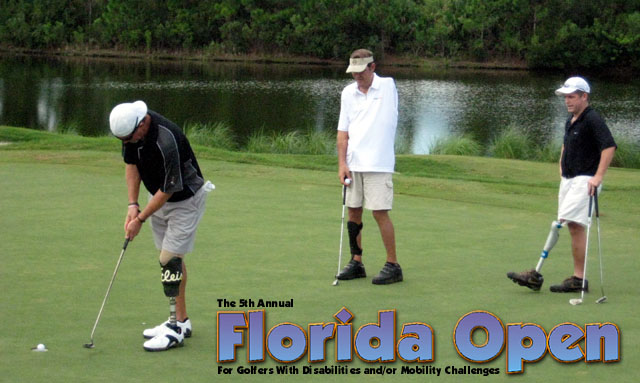
The
2010 Florida Open
For Golfers With Disabilities
and-or Mobility Challenges
“The
goal of the ‘all-inclusive’ open tournament is to “have
fun playing golf, while raising
awareness of accessibility issues concerning golfers with disabilities
and/or mobility challenges.” |
|
Golf
is the culmination of mind and body integration and while some
golfers measure how straight and far they can hit the ball, others
measure how hitting the ball enhances their life. Significant
improvement as a result of participation in the game demonstrates
determination, patience, and growth as a person. There truly
is something about golf that can bring out the best in a person,
and nowhere is this made more evident than at the Florida Open
Golf Tournament for Golfers with Disabilities and/or Mobility
Challenges.
Known as the
Florida
Open for Golfers with Disabilities, for short, the 5th
annual all-inclusive event was held on August 28th, 2010, at
PGA Village in Port St. Lucie, Florida. The open tournament was
played on the Tom Fazio designed Wanamaker Course at the prestigious
PGA Club and was an inspiring success and a lot of fun for all
the participants.
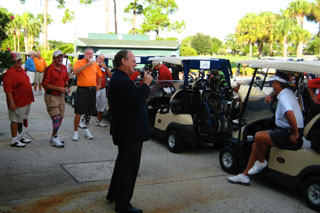
Steve Jubb, who is Director of PGA
Charities for the PGA Foundation, and a representative of the
National Alliance for Accessible Golf made everyone feel at home
as he gave the opening address to all of the tournament participants. |
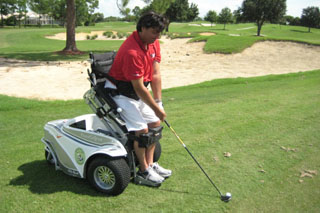
South African, Anthony Netto participated
in the 2010 Florida Open For Golfers With Disabilities using
his adaptive golfcart called a ParaGolfer. |
The aforementioned
open tournament was founded in 2006 by Florida Golf Magazine
with the help of some initial ‘much needed’ guidance
provided by the National Alliance for Accessible Golf. Just as
it has been since its inception, this tournament is definitely
not-for-profit. The bare-bones entry fee of $50 has always included
18 hole green fees, an award banquet, range balls and prizes.
This open tournament raises no money for any cause, nor does
it try to get anyone to join any organizations or foundations
of any kind. The goal of the ‘all-inclusive’ open tournament
has always been to have fun playing golf, while raising awareness
of accessibility issues concerning golfers with disabilities
and/or mobility challenges.
For the previous
four years this not-for-profit tournament was graciously hosted
by the generous folks at Kissimmee Bay Country Club. Bob Baldassarri
the General Manager at PGA Village should be commended for volunteering
to be involved with the 2010 event. The PGA Club is a prestigious
venue and all the players were grateful and very much appreciated
its historic significance and its ambiance.
In 2010, this
very international tournament included golfers from the United
States, Italy, United Kingdom and South Africa. In total, 46
golfers participated, rallying to raise awareness for accessibility
issues concerning golfers with disabilities and-or mobility challenges.
But more importantly, they came to bond with their peers and
support one another while “having a blast” playing
golf.
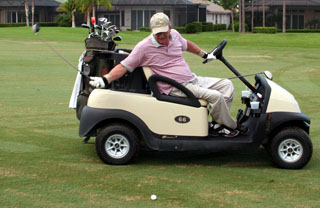
Jeff Roulston from San Mateo FL
prefers playing from a convertible Golf Cart. |
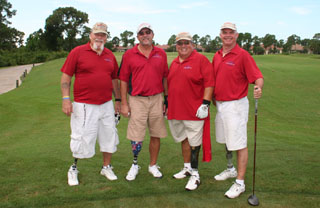
Foursome representing the Amputee
Veterans of America Support Team (AVAST) |
Participants
of the 5th annual tournament included golfers of all levels of
abilities. As in previous years, several members and representatives
of the Amputee Veterans of America Support Team (AVAST), Eastern
Amputee Golf Association (EAGA), Southern Amputee Golf Association
(SAGA) and the National Amputee Golf Association (NAGA) competed
in the open tournament, some of whom wore prosthetics and some
who didn’t. But make no mistake; this all-inclusive tournament
was not just for amputees. There was a diverse group of golfers
participating that were mobility challenged from the effects
of a wide range of conditions, including strokes, paraplegia,
and traumatic brain injuries.
In a conscious
effort to be all-inclusive, golfers without disabilities are
also always encouraged to play in the open tournament, along
with their friends with disabilities, and are eligible to compete
for the Overall Low Gross Award, and of course, anyone with a
USGA Handicap is also eligible to compete for the Male and Female
Low Net Awards. As always the player with the lowest gross got
the honor of having their name inscribed on the permanent open
tournament trophy.
“Addressing
the needs of golfers with disabilities is more than just the
right thing to do, it's good business.”
Making
an investment in golfers with disabilities is a hot new trend
in the business world, and according to a census bureau report,
one in five U.S. residents has a disability. That’s about
18% of the U.S. population or 51.2 million people. More and more
people, such as inventors, designers and golf course owners,
are now making an effort to address the needs of golfers with
disabilities. This tournament lets everyone have a lot of fun
while raising awareness of these issues.
One innovative
company that has helped to raise awareness of the issues concerning
golfers that are mobility challenged, by sponsoring the all-inclusive
2009, 2010 and next year’s Florida Open For Golfers With
Disabilities is Bridgeburg Golf (www.bridgeburggolf.com)
The compassionate
folks at Bridgeburg Golf are the makers of the Turf Chopper;
a new three wheeled single rider electric golf cart that weighs
only 150 lbs. This new addition to the golf cart arena is compact,
quiet, affordable and easy to operate. (See back cover.) Not
by coincidence the name was chosen because its unique design
resembles a three-wheel motorcycle “chopper”. But that’s
where the comparison ends.
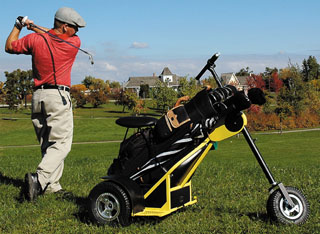
|
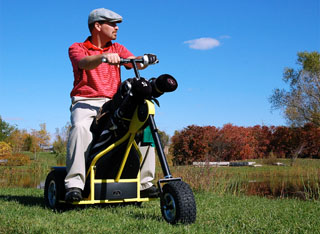
|
|
Bridgeburg Golf, maker
of the versatile Turf Chopper single-rider golf cart sponsored
the open tournament. |
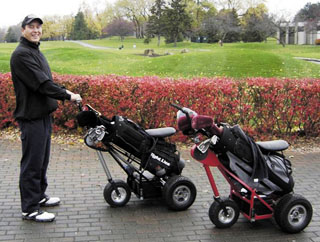 The
Turf Chopper also easily converts to a walk-behind cart caddy,
for those wet days when carts are not allowed off the cart-path. The
Turf Chopper also easily converts to a walk-behind cart caddy,
for those wet days when carts are not allowed off the cart-path.
Billed
as “a next generation golf cart,” the Turf Chopper
has revolutionized the single-rider concept that is beginning
to reshape the industry, and priced at less than $2000, it offers
a cart that’s price-point is far below many current options
available.
Weighing in at
a mere 150 pounds without rider and clubs, the cart exerts less
weight per square inch than conventional and other single rider
carts and leaves no discernible footprint. This is a definite
plus for greens-keepers and course maintenance.
Many Florida
golf courses will now allow golfers with disabilities to ride
these types of lightweight single rider carts onto the putting
greens, and for many mobility challenged golfers it is the only
way they can get out and play golf.
Born out of necessity,
the Turf Chopper’s inventor experienced debilitating back
pain while playing his favorite game. He loved golf but said
walking 18 holes was out of the question and riding in a conventional
cart only made matters worse. Being determined and resourceful,
he set out to build a cart that would adapt to his needs; after
several attempts the prototype for the first Turf Chopper came
to fruition.
In 2011 Bridgeburg
Golf will once again be a corporate sponsor of the Florida Open
For Golfers With Disabilities. They have committed to bring a
dozen Turf Chopper’ single rider golf carts for players
to use during the tournament. In 2011, the 6th annual open tournament
will again be played at PGA Village on October 15th, 2011 at
the prestigious PGA Club in Port St. Lucie, Florida.
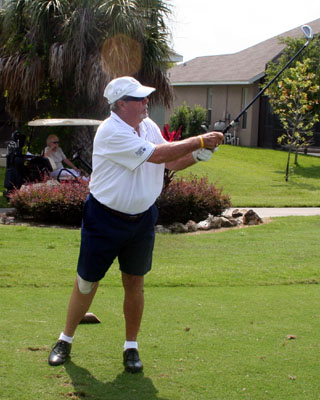
Virgil Price, a St Petersburg resident
and Treasurer of the National Amputee Golf Association (NAGA),
dominated the inaugural tournament in 2006, winning 1st Place
overall, scoring a gross 72 on the challenging 18 holes at Kissimmee
Bay. |
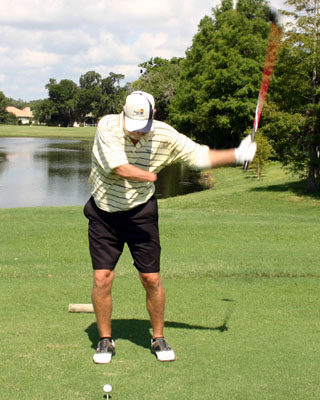
Mike Hudson shot a 75 to win 1st
place Overall in the 3rd Annual Florida Open Tournament for Golfers
with Disabilities and/or Mobility Challenges held on 7/14/08.
Born with only one hand, Mike Hudson is a Volunteer Golf Instructor
in Pasco County. |
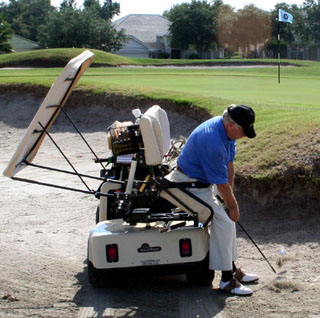
Tampa resident, Monroe Berkman,
a polio surviver, won the 2007 Florida Open Tournament for Golfers
with Disabilties, playing every shot, including sandtraps from
his SoloRider Adaptive Golfcar. Berkman, who shot 80 had no problems
hitting out of the bunkers using his stand-up seat to support
him during his full golf swing. |
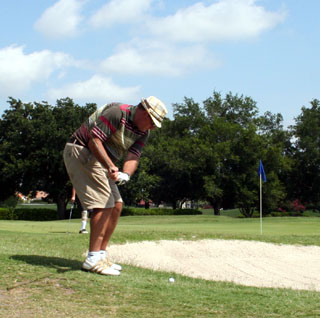
Stroke survivor, Ian Halliwel came
all the way from England and shot a 74 to win 1st Place Low Gross
in the 2009 Florida Open Tournament for Golfers with Disabilties
and/ or Mobility Challenges. Now his name is also inscribed on
the prestigous Open tournament trophy. |
The 2010 tournament
was won by 40 year-old Palm Beach Gardens resident Steve Shipuleski.
Shipuleski who shot a gross score of 81 plays golf with one hand,
has a 14 handicap, and plays most of the time at the Golf Club
of Jupiter. Although he is tall at 5’11”, he says that
he shortened and re-gripped all of his own clubs himself. He
also says that he was born without the use of his left hand and
since he plays golf right handed, and the right hand is normally
held lowest by right handed golfers, that shortening the length
of the shafts gives him more control.
Shipuleski also
said that he could drive the ball farther by swinging backhanded
like a lefty but has more control and finesse with his short
game when he swings right handed. So, even though he is capable
of playing either way, addressing the ball with a right handed
swing is a conscious decision on his part.
Shipuleski had
his golf instructor and caddy, Carter Rodowicz with him and said,
“Carter taught me how to play. He’s the best instructor
I've ever seen. He played on the Hooter’s Tour years and
years ago.”
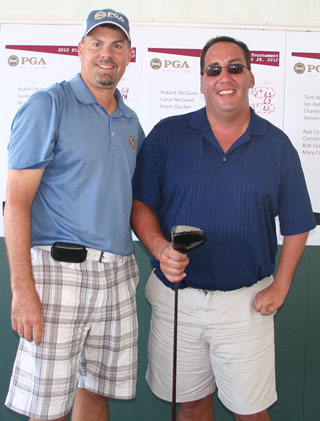
|
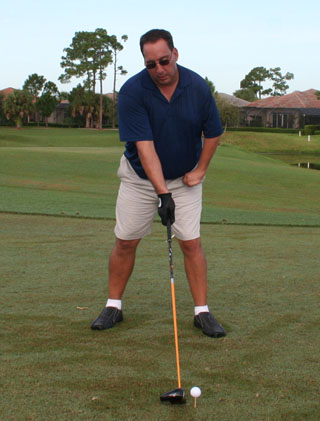
|
|
Master of Ceremonies, David Windsor,
PGA, is shown here congratulating Steven Shipuleski, the 1st
Place winner of the 2010 Florida Open Golf Tournament for Golfers
with Disabilities and/or Mobility Challenges. Shipuleski’s
name will be engraved on the permanent tournament trophy with
the that of previous winners. |
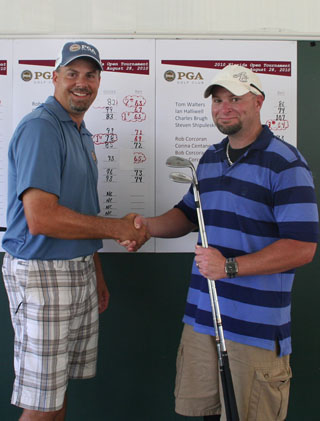
|
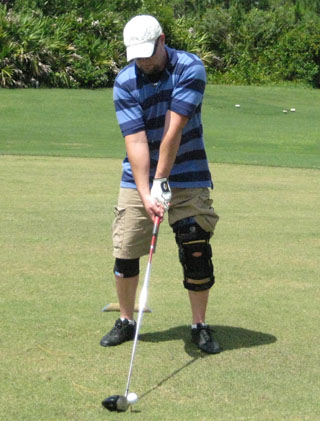
|
|
National Adaptive Golf Trainer,
David Windsor, PGA, presented his student, Kevin Slucher, a disabled
Gulf War Veteran, his Vokey wedges donated by Titleist Golf,
for being the Low Net winner of the The 2010 Florida Open Golf
Tournament for Golfers with Disabilities and/or Mobility Challenges. |
New Smyrna Beach
resident Kevin Slucher, who plays with a 20 handicap won the
Male Low Net Award in the tournament with a gross score of 83,
and a net-63. Slucher, a disabled Gulf War Veteran, who says
he is always in severe and constant pain, has a relatively slow
swing speed compared to some golfers. But his syrupy-slow swing,
which is as smooth as 12 year old single malt Scotch, (in a Ben
Hogan sort of way) was quite effective.
Mary Corcoran
of Melbourne, an 18 handicapper shot a Gross 82, and won the
Female Low Net Award with a net-64. Mary played with her husband
Bob Corcoran, also an 18 handicapper, who wears a prosthetic
leg below one knee. For being the Female Low
Net winner, Mary was presented with a new putter from Master
of Ceremonies, David Windsor, PGA, and Founder of the Adaptive
Golf Academy (www.AdaptiveGolfAcademy.com),
at which point, Mary who already had a putter that she was quite
fond of, magnanimously awarded it to her new young friend, seven
year-old David Del Purgatorio Jr. in recognition of his accomplishments
on the golf course that day.
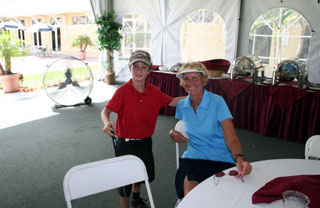
|
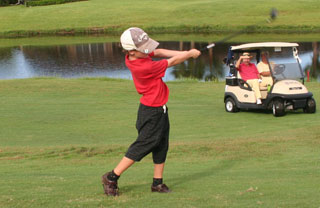
|
|
Mary Corcoran of Melbourne, an 18
handicapper shot a Gross 82, and won the Female Low Net Award,
a putter, but then gave it as a gift to 7 year-old David Del
Purgatorio Jr. in recognition of his acomplishments on the golf
course that day. At age 7, David Del Purgatorio Jr. was the youngest
player in the open tournament. |
Very much impressed
with the tournament and all its participants, David Purgatorio
Sr. said that as far as he was concerned, the experience was
priceless for his son David Purgatorio Sr. “When Dave Windsor
first invited us to participate in the tournament,” he said,
“I didn’t know how my seven year-old son was going
to react. Being so very young made him different than everybody
else, so he was in the same boat that they were, yet no one looked
at him funny. That was very cool. David felt like he was just
one of the group and that was truly great. We had a ball, I can't
wait to do it again next year.”
Although all
the participants got along famously, the ever-present “Pace
of Play” issue raised its ugly head in this year’s
tournament. And, since the Florida Open for Golfers with Disabilities
is a groundbreaking ‘all-inclusive’ golf tournament,
what better place is there to address the controversial issue?
In-a-nutshell,
the tournament’s official response to the controversial
pace of place quagmire was; to wait for the last group to get
in but, in an all-out effort to be all-inclusive, at next year’s
tournament we will also have voluntary early tee times a full
hour before the normal 8:00 am shotgun start. So, in the 2011 open tournament on Oct. 15th,
2011 at Long Marsh Golf Club, if you think you or someone
in your foursome might be a “jist a wee-bit slow,”
it is suggested that your foursome starts at 7:00 am.
At that point,
everyone relaxed and enjoyed the wonderful lunch that was prepared
by the kind folks at the PGA Club, and waited for the last team
to finish their round. As it turns out the last foursome was
slowed by the 2010 tournament’s only TBI (Traumatic Brain
Injury) survivor Charles Manning Brugh, also know as “Brew”.
Brew, who was
more than just the open tournament’s token TBI survivor,
was thought by many to be one of the most noteworthy golfers
at the tournament. You see, although Brew walks and talks slow
and methodically due to his TBI, he is really a very articulate
writer and had previously written a very moving and informative
piece that was published in the Winter 2010 issue of Florida
Golf Magazine about what the open tournament meant to him.
Therefore, most
everyone knew Brew and knew how important playing and counting
every stroke was to him. What’s more, Ian Halliwell, the
winner of last years open tournament, who had come all the way
from the U.K. just to defend his title, had also taken it upon
himself just as he had done in the previous year’s tournament,
to be Brew’s mentor, coach and personal English caddy. Therefore,
if everyone wanted to wait for the defending champion to finish,
they also had to wait for his ‘best chum’, Brew.
The defending
champion, Ian Halliwell, who is a stroke survivor and a 17 handicapper,
is also a renown world traveler and staunch supporter for the
Stroke Association in the U.K., and to truly appreciate his remarkable
friend for who he is a steadfast caddy, you must read the following
brief excerpts that are reprinted here from Ian’s June 2009
internet blog. |
|
The
Social Golfer is a travel and golf journal, web-site, and blog
written by avid golfer and stroke survivor, Ian Halliwell, about
his recovery and tireless fund-raising around the world for The
Stroke Association. (www.stroke.org.uk)
Excerpts from ‘The Social
Golfer’ Blog www.thesocialgolfer.blogspot.com
Written by Ian Halliwell, Tuesday, 23 June 2009
I
leave this trip with the story of the guy who inspired me most.
I thought I had it difficult till I read this letter from him,
and I offer it as encouragement to all individuals who suffer
illness and disability, and to all of us who are feeling down
because of the economic climate as a reality check as to what
is important.
From Charles Brugh: bruha_2121@yahoo.com
To: Ian Halliwell: iwhalliwell@aol.com
“I'm unclear
what I’ve told you previously about me and my injuries (I
have declarative & procedural memory deficits). Your remarkable
recovery from stroke is truly inspiring. I am amazed and impressed.
I have already directed a stroke survivor’s family to your
web-site (the stroke survivor is still unable to communicate).
Like you, the survivor was an avid golfer pre-stroke.
I always enjoy
any activity in which I choose to participate. Having said that,
I’d like to explain my additional motivations for avid participation
in adaptive athletics in general, and specifically the great
sport of golf (!) I am a severe Traumatic Brain Injury survivor.
Due to diffuse axonal shearing, MOST structures in my complex
neural network were greatly impaired. Resulting from a near-fatal
automobile accident in March of 1990, I've used diverse adaptive
athletics to recover from MASSIVE brain damage for almost two
decades.
For the last
19+ years I’ve retaught myself to walk, talk, swallow, feed
myself, bathe myself, read, write, THINK, I was legally blind
for a period, I was paralyzed from the neck down at one point,
the eclectic list is long and sordid. I have no doubt your experience
with stroke produced similar challenges.
I’m rebuilding
my once decimated brain, neuron by neuron – synapse by synapse.
I am doing so through copious independent study on numerous topics,
and ardent participation in multiple diverse athletics. Rigorous
engagement in adaptive sport promotes regrowth of neurons (neurogenesis)
and rewiring (neuroplasticity) of my once decimated brain.
I attempted golf
soon after I was released from the rehabilitation hospital. In
’91-’92 the golf swing was far too complex for my damaged
brain to comprehend, let alone execute! I have worked, hard,
for the last 19+ years to rehabilitate so I may return to the
great sport of golf.
A multi-sport
athlete, I could have chosen to apply for a number of 'tools'
(sports equipment) to further my neurologic rehabilitation. I
chose golf. Armed with a generous Challenged Athletes Foundation
equipment grant, I selected, and was custom fit, for Ping G10's.
As a survivor of severe brain trauma, the great game of golf
is a pinnacle of mind/body integration. The 2009 Florida Open
for Golfers with Disabilities, in which I had my #1 English caddy
guiding and encouraging me, marked my official return to golf.
I consider golf
the equivalent of a graduate degree from a prestigious university
for neurologic rehabilitation. Though an avid golfer pre-TBI,
I know I’m a ‘newbie’ to golf and have much to
relearn and perfect. I’m thrilled, after almost two decades
of intense rehabilitation, to have finally begun my reintroduction
to golf. I intend to go as far as I can through golf as a as
therapeutic modality Though I have much to relearn, I have (finally)
reached a point where I may again pursue the great game of golf!
Charles Manning
Brugh, AKA ‘Brew’
Without
incredible challenge, a person is unable to achieve incredible
success. This I am sure you will all agree is a tremendous story
and truly reflects what the human body and mind can achieve.
My achievements pale into insignificance. I am humbled in his
presence, I hope we remain good friends, in good health, and
that I can be a little part of his continued remarkable story.
Meeting people
like Charles (aka Brew) makes my campaign for stroke awareness
all the more worthwhile. I hope that he his able to join up with
me when I hit Florida on my Round the World Trip next year.
Ian Halliell,
‘The Social Golfer’ June 2009
|
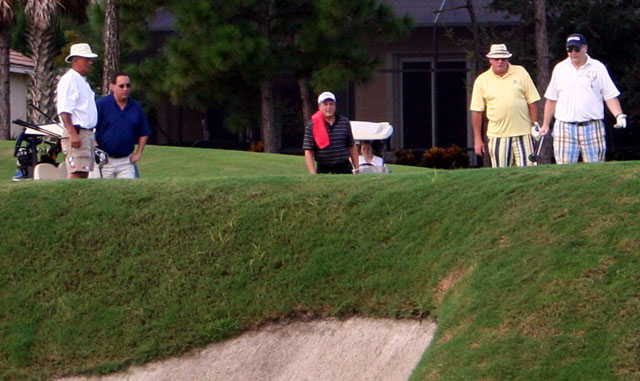
Foursome of Winners: Tournament
winner Steven Shipuleski and his instructor-caddy, Carter Rodowicz
are seen here on the left with fellow tournament participants
EAGA Member Tom Walters, stroke survivor and 2009 Champion-Ian
Halliwell, and Traumatic Brain Injury survivor Charles Manning
Brugh.
Finally,
5+ hours after the shotgun start of the 2010 Florida Open for
Golfers with Disabilities, the last foursome meandered in and
it turned out the winner of this year's tournament, Steven Shipuleski,
was playing with Ian, Brew and Tom.
That is when
Tom Walters suggested the foursome should start an hour early
next year. When Tom, who played with Ian and Brew in the 2009
Florida Open for Golfers with Disabilities at Kissimmee Bay,
was asked if he wanted to play with the same foursome next year,
he said he preferred playing with them because they were his
friends. When the new 2010 champion, Steven Shipuleski, was also
asked if he wanted to play in the same foursome next year Steven
said: "If I have a chance to play with those three guys
next year, I'd love to play with them again. Those guys were
great! Brew was inspiring. He never gave up, he kept pushing
and pushing. That's what we're here for, to support one another.
Brew is great."
Being the unstoppable
positive thinker that he is, Brew informed us he is looking for
sponsorship to help him in his quest to compete in the 2016 Paralympics
in Rio de Janeiro. In regard to being the only TBI survivor to
have played in the tournament, Brew added, "I consider it
a badge of honor to be the only Traumatic Brain Injury survivor
playing in the Florida Open for Golfers with Disabilities. While
proud of that distinction, I am also a little disheartened. I
would like to see more TBI survivors playing golf, not because
it's a sport they can do in spite of brain injury, but because
golf, played consistently as part of an overall therapeutic regimen,
will help individuals recover from Traumatic Brain Injury - I'm
living proof."
So, the moral
of this story might very well be: there truly is something about
golf that brings out the best in a person, and nowhere is this
made more evident than at the Florida
Open for Golfers with Disabilities.
For
info about next year’s tournament visit www.floridagolfmagazine.com/open
or call  863-227-2751. 863-227-2751.
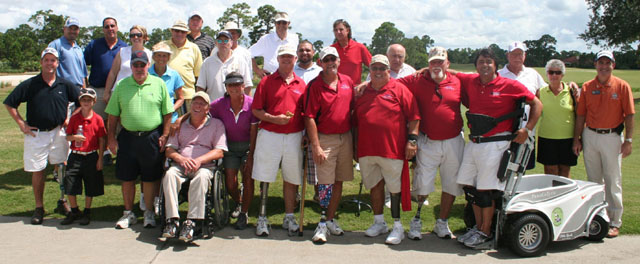 |
|
Page 28-34 From Winter
2011 Florida Golf Magazine ©Copyright 2011, All Rights
Reserved. Subscribe at floridagolfmagazine.com/subscribe
To advertise in Florida Golf Magazine in print and on-line,
phone 863-227-2751 and/or email joestine@floridagolfmagazine.com |
|